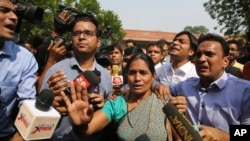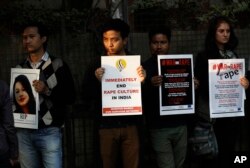Four-and-a-half years after the horrific gang rape of a 23-year-old woman in New Delhi, India’s Supreme Court has upheld the death penalty for four men convicted in the brutal assault that led to her death.
The decision brings to a close a case that triggered an unprecedented wave of public outrage and turned a global spotlight on sexual violence against women in India.
Applause broke out in the packed courtroom Friday and there were tears in the eyes of the young student's mother as the judgment was handed down. Her father, Badri Nath Singh, said it “was a big victory, not just for the family, but for the country.”
The assault
The young paramedic student was brutally assaulted by five men and a juvenile on a moving bus she had boarded with a male friend. She died two weeks later in a Singapore hospital due to the injuries she suffered.
Calling it brutal, diabolical and barbaric, the Supreme Court said the crime shook the conscience of society. The Court said the crime's perverse nature put it in the “rarest of rare category” that called for the death penalty.
Women activists hailed Friday’s judgment as a landmark decision. “This is a historic judgement,” said Ranjana Kumari, who heads the Center for Social Research in New Delhi. “This is a real clear message that you cannot get away with it, you will not be spared, and this is something I hope will have a deep impact on the nation’s psyche, of the people who create all kinds of conditions for crime and commit crimes against women.”
Out of the six charged with the gang rape, one hanged himself in prison. The juvenile involved has been released after spending three years in detention. All six were poor migrants living in a crowded and poor neighborhood.
The four men sentenced to death are all in their twenties.
A defense lawyer for three of them said he would file a review petition to the chief justice.
Protests
For months after the crime, the streets of New Delhi were filled with angry protests demanding justice for the victim. Many protesters held banners calling for the death penalty.
By the standards of India’s slow-moving justice system, the intense spotlight on the case ensured that it drew to a close in fewer than five years. Many cases drag on for much longer. The initial death sentences in the rape case were handed down in 2013 by a fast-track court.
The gang rape prompted the government to speed up trials for rape and toughen penalties for offenders.
The tighter laws, however, do not appear to have been a deterrent, as the number of reported cases of sexual assaults have not come down.
“Women are very, very vulnerable in our country,” says Mariam Dhawale of the All India Democratic Women's Association.
Women activists like her point out that although laws have been strengthened, conviction rates in crimes against women are still low. “The laws have to be implemented, punishment has to be given, this will send a strong message,” she says.
On the positive side, activists say more women now have shown the courage to report a crime that had rarely been spoken of earlier, but is now very much a part of public debate.






